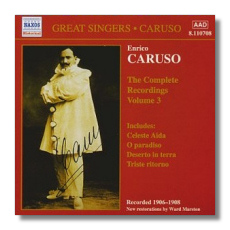
The Internet's Premier Classical Music Source
Related Links
- Latest Reviews
- More Reviews
-
By Composer
-
Collections
DVD & Blu-ray
Books
Concert Reviews
Articles/Interviews
Software
Audio
Search Amazon
Recommended Links
Site News
 CD Review
CD Review
Naxos Historical

Prokofieff Plays Prokofieff
- Piano Concerto #3 in C Major, Op. 26
- Suggestion diabolique, Op. 4/4
- Visions fugitives, Op. 22:
- #3, Allegretto
- #5, Molto giocoso
- #6, Con eleganza
- #9, Allegro tranquillo
- #17, Poetico
- #18, Con una dolce lentezza
- #11, Con vivacità
- #10, Ridicolosamente
- #16, Dolente
- Symphony #1 in D Major "Classical", Op. 25 (Gavotte)
- Piano Sonata #4 "From Old Notebooks" in C minor, Op. 29 (Andante)
- Tales of an Old Grandmother, Op. 31/2,3
- Gavotte, Op. 32/3
- Étude, Op. 52/3
- Sonatine Pastorale, Op. 59/3
- Paysage, Op. 59/2
Serge Prokofieff, piano
London Symphony Orchestra/Piero Coppola
Naxos Historical 8.110670 Recorded 1932 (Concerto) and 1935


Ludwig van Beethoven
- Piano Concerto #3 in C minor, Op. 37
- Piano Concerto #4 in G Major, Op. 58
- Rondo for Piano & Orchestra in C Major, WoO. 6
Artur Schnabel, piano
London Philharmonic Orchestra/Malcolm Sargent
Naxos Historical 8.110639 Recorded 1933


Enrico Caruso
The Complete Recordings, Volume 3
- Giuseppe Verdi:
- Aïda - "Celeste Aïda"
- La forza del destino - "Solenne in quest'ora"
- Rigoletto - "Bella figlia dell'amore"
- Giacomo Meyerbeer: L' Africaine - "O paradiso"
- Ruggero Leoncavallo: I Pagliacci - "Vesti la giubba"
- Giacomo Puccini:
- La bohème
- "O Mimi, tu più non torni"
- "O soave fanciulla"
- "Ackho, dolce svegliare alla mattina"
- Madama Butterfly - "O quanti occhi fisi"
- Gaetano Donizetti:
- Dom Sébastien, roi du Portugal - "Deserto in terra"
- Lucia di Lammermoor - "Chi mi frena in tal momento?"
- Georges Bizet: Les Pêcheurs de perles - "Del tempio al limita"
- Umberto Giordano: Andrea Chénier - "Un dì all'azzurro spazio"
- Richard Barthelemy:
- Triste Ritorno for Voice & Orchestra
- Valse Lente for Voice & Orchestra "Adorables Tourments"
- Francesco Paolo Tosti: Ideale
Naxos Historical 8.110708 Recorded 1906-08
These three Naxos issues could be put on any list of important historical recordings. Although Prokofieff made some piano roll recordings and appeared on a couple of other releases as a conductor in the 1940s, this disc of his piano compositions was the only one issued in his lifetime and may be the only reliable example of his considerable pianistic skills on record. There were rumors of a recording of his Sixth Sonata, but as yet it has not surfaced. The middle movement of the Fourth contained on this disc is the only (partial) sonata recording known to be made by the composer.
Prokofieff's account of his Third Concerto is the fastest recorded version I've encountered – and I have or know of forty or fifty different renditions. It is marginally faster than even the speedy Kapell. But, you ask, does the composer's driving tempos produce a thrilling performance? It is an interesting one, to be sure, even compelling throughout most of its duration. But Janis, Cliburn, both recordings by Argerich, the two by Browning, Gutierrez, Graffman (Sony, not the RCA) and other versions are preferable. For one thing, though Mark Obert-Thorn has done fine transfers here, the sound is fuzzy, with the piano recorded quite distantly and shrilly. The masters just weren't that good to begin with. Moreover, Prokofieff was a quirky interpreter – at least on that day in 1932 – playing some passages in wholly unique ways – try the third variation in the second movement, which sounds almost bizarre in the way rhythms seem to get lost.
I first heard this recording about forty years ago and was amazed at the composer's individual style. I still am today, but it's the solo works here that are of greater importance. The Suggestion Diabolique is spectacularly played, and the grim, dark Andante from the Fourth Sonata has never sounded so sinister and biting. Other pieces, like most of the nine excerpts from the Visions Fugitives, and the Op. 52 étude, a transcription from his ballet, The Prodigal Son, are also brilliantly rendered. This disc is a must for Prokofieffians and for those interested in great pianists of the 20th century.
Speaking of great pianists from the 20th century, Schnabel turns in strong performances here in the Beethoven Third and Fourth Concertos. As most know, he has been closely associated with the music of Beethoven, and many consider his traversal of the 32 Sonatas as a benchmark among 20th century Beethoven cycles. Schnabel's tempos are very fast, like Prokofieff's, like those of so many pianists from that era. One has to wonder if these artists from generations ago had a penchant for fast tempos or were urged by some label executive to speed ahead in order to squeeze the performance onto fewer 78-rpm discs. In any event, Schnabel's readings are certainly not egregiously fast, and his insights are many. Sargent obtains fine support from the London Philharmonic and Obert-Thorn's transfers make this quite a listenable experience.
As for the Caruso disc, we are taken back to a relatively ancient period in recordings. However, the transfers, this time by Ward Marston, again are excellent, and Caruso has thus rarely sounded better on disc. The opening aria, Celeste Aïda, comes through powerfully, even if the scaled-down orchestral support has that canned sound one associates with the earliest movie soundtracks. The two accounts of Bella figlia dell'amore from Rigoletto (both with Bessie Abbott, soprano) are splendid efforts, as are Vesti la giubba from I Pagliacci, and O Mimi, tu piu non torni, from La Bohème. Many modern listeners will find the sonic atmosphere here alien to their sensibilities, but to those who want another example of this great artist's gifts, this disc will be indispensable.
Copyright © 2002, Robert Cummings


















